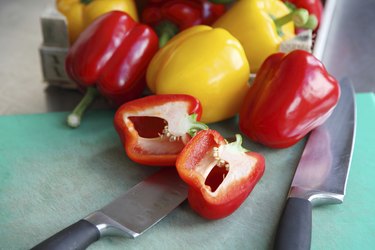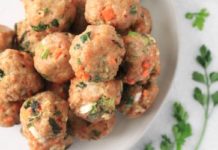 An overhead view of a basket of red and yellow tomatoes. Image Credit: ozgurcoskun/iStock/Getty Images
An overhead view of a basket of red and yellow tomatoes. Image Credit: ozgurcoskun/iStock/Getty Images
From yellow bell peppers to Yukon potatoes, yellow-hued vegetables are rich in carotenoids, the pigments that give them their vibrant color. These vegetables also contain many nutrients, and offer several health benefits, according to the Linus Pauling Institute. They offer much variety in the way of meal options, from serving as salad toppings to being baked into bread.
Video of the Day
Yellow Bell Peppers
 Red and yellow bell peppers on a cutting board with chopping knives. Image Credit: PGoodie76/iStock/Getty Images
Red and yellow bell peppers on a cutting board with chopping knives. Image Credit: PGoodie76/iStock/Getty Images
Crisp and slightly sweet with a vibrant, rich hue, yellow bell peppers are high in Vitamin C, states Produce for Better Health Foundation. They should be firm and have tight skin when purchased; avoid buying them shriveled. Left raw, they can be sliced and eaten as a snack, or used to top a green salad. Try roasting them with potatoes, or including them in a salad of beans and tomatoes.
Sweet Corn
 Seven cobs of freshly peeled yellow sweet corn. Image Credit: Gary Faber/Photodisc/Getty Images
Seven cobs of freshly peeled yellow sweet corn. Image Credit: Gary Faber/Photodisc/Getty Images
Corn is a starchy vegetable that is rich in Vitamin C, lutein and zeaxanthin, which promote eye health according to Eating Well. Choose corn with husks that aren't dry or pale, as farmer Kevin Smith tells Eating Well. Corn can be roasted or grilled on the cob, used raw or roasted in a salad with black beans and bell peppers, or even baked into a pudding.
Squash Varieties
 Yellow summer squash growing on the vine in the garden. Image Credit: lindmon/iStock/Getty Images
Yellow summer squash growing on the vine in the garden. Image Credit: lindmon/iStock/Getty Images
Squash is technically a fruit because it has seeds, but it is often thought of, and used, as a vegetable. Yellow summer squash is high in fiber and Vitamins A and C, according to Better Homes and Gardens. Versatile in cooking options, it can be boiled, steamed, baked, grilled, roasted or broiled. Try sauteing it with zucchini and using it to top rice, or baking it into bread or grilling it with other vegetables for a shish kabob. Butternut squash has a golden yellow hue, and has lots of fiber, potassium and Vitamin B6, making it beneficial for the heart and nervous system, according to Whole Living. It can be pureed for soup, or sliced and added to pasta. Another option is the fiber-rich acorn squash, per Men's Fitness; try slicing it in half and baking it for a simple side dish.
Golden Beets
 Three whole golden beets with tops on a cutting board. Image Credit: slearmonth2/iStock/Getty Images
Three whole golden beets with tops on a cutting board. Image Credit: slearmonth2/iStock/Getty Images
Unlike other yellow vegetables, golden beets get their color from betalains, a type of pigmentation that also serve as antioxidants and may decrease inflammation, according to Whole Foods. Try slicing them very thinly and adding them to a green salad, per Martha Stewart, or roasting and pairing them with red beets.
Yellow Potatoes
 A wooden bowl of golden yukon potatoes on a patio deck. Image Credit: Stephen Kane/iStock/Getty Images
A wooden bowl of golden yukon potatoes on a patio deck. Image Credit: Stephen Kane/iStock/Getty Images
Ranging from pale yellow to golden brown, with golden yellow flesh, Yukon gold potatoes are waxy with low-to-medium starchiness. Avoid using them in potato salads, as they may fall apart; instead, try steaming or boiling them and sprinkling with your favorite seasoning.










































